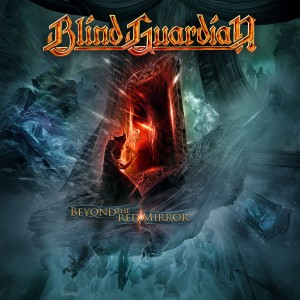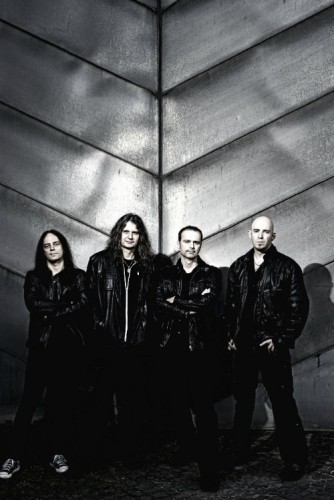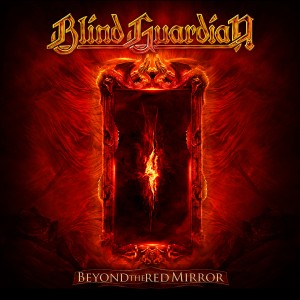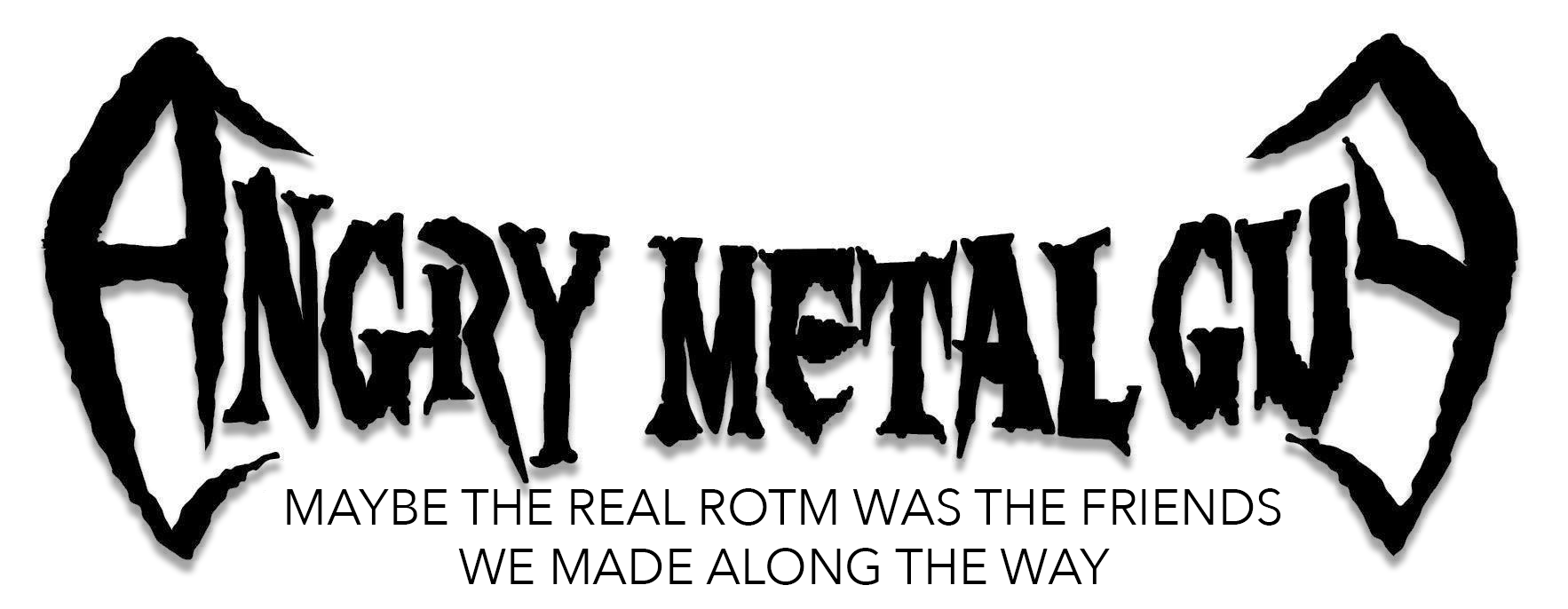 Blind Guardian is a German institution and national treasure. The band embodies the peak of the German power-thrash tradition in ways that nod to their countrymen, but separated them from the pack decades ago. Their body of work is surely among the most comprehensively epic and impressive among modern metal bands, and they are a band whose sound is a point of reference rather than a derivation. So when these titans of Teutonic metal release a new record the metal world turns to pay its respects. Put differently, Beyond the Red Mirror has been on my calendar since I heard of its release, and when asked, fans of this blog have also said resoundingly that it’s one of the most anticipated records of 2015. As long-time readers of this blog are aware, anticipation can be dangerous. One might surmise that Angry Metal Guy’s Law of Diminishing Recordings™ is contingent not on an individual band’s output, but instead correlates with heightened expectations from fans and reviewers1.
Blind Guardian is a German institution and national treasure. The band embodies the peak of the German power-thrash tradition in ways that nod to their countrymen, but separated them from the pack decades ago. Their body of work is surely among the most comprehensively epic and impressive among modern metal bands, and they are a band whose sound is a point of reference rather than a derivation. So when these titans of Teutonic metal release a new record the metal world turns to pay its respects. Put differently, Beyond the Red Mirror has been on my calendar since I heard of its release, and when asked, fans of this blog have also said resoundingly that it’s one of the most anticipated records of 2015. As long-time readers of this blog are aware, anticipation can be dangerous. One might surmise that Angry Metal Guy’s Law of Diminishing Recordings™ is contingent not on an individual band’s output, but instead correlates with heightened expectations from fans and reviewers1.
Despite my enormous respect for the band, I have mixed feelings about Blind Guardian’s post-A Night at the Opera releases. The band has been inconsistent for a long time, and while At the Edge of Time did eventually grow on me, A Twist in the Myth never has. And while it might not feel like it, the band’s most widely acclaimed records—Imaginations from the Other Side and Nightfall in Middle-Earth—are 20 and 17 years-old respectively in 2015. However, Beyond the Red Mirror has been promoted as a record of epic proportions. With the use of three different choirs, an orchestra, and 4 years in the making, this conceptual piece connects back to Imaginations from the Other Side thematically2. And that sales job had me prepared for something truly epic and excellent.
 And Beyond the Red Mirror cannot be faulted for its epic vision. “The Ninth Wave” starts the album off with a choir singing in Latin (“spookytus!“) with snare and an orchestra supporting the epic build and drums that evoke A Night at the Opera’s use of drum machine immediately. The song is 9 minutes long with marathon solos and shifts in and out of driving thrash and more progressive passages. “The Ninth Wave” sounds like Blind Guardian circa Imaginations, possibly more so than any record since Nightfall. The music is driving, thrashy, and despite all the talk of epic orchestras, there’s actually quite a lot of the album that lacks orchestrations. Instead, triplet thrash riffs and trademark harmonized guitar solos are driven by double kick and bass that rests under layers and layers and layers of vocals. For me, this is where Beyond the Red Mirror is at its most successful and the album is packed with great songs. The drive of straight up thrash with sick riffs on “Ashes of Eternity,” pop with epic energy. The double-bass-punctuated shrieks of Hansi in “The Twilight of the Gods” gives way to a classic chorus and features amazing solos. “The Holy Grail,” too, is a neck breaker that stands out on every listen.
And Beyond the Red Mirror cannot be faulted for its epic vision. “The Ninth Wave” starts the album off with a choir singing in Latin (“spookytus!“) with snare and an orchestra supporting the epic build and drums that evoke A Night at the Opera’s use of drum machine immediately. The song is 9 minutes long with marathon solos and shifts in and out of driving thrash and more progressive passages. “The Ninth Wave” sounds like Blind Guardian circa Imaginations, possibly more so than any record since Nightfall. The music is driving, thrashy, and despite all the talk of epic orchestras, there’s actually quite a lot of the album that lacks orchestrations. Instead, triplet thrash riffs and trademark harmonized guitar solos are driven by double kick and bass that rests under layers and layers and layers of vocals. For me, this is where Beyond the Red Mirror is at its most successful and the album is packed with great songs. The drive of straight up thrash with sick riffs on “Ashes of Eternity,” pop with epic energy. The double-bass-punctuated shrieks of Hansi in “The Twilight of the Gods” gives way to a classic chorus and features amazing solos. “The Holy Grail,” too, is a neck breaker that stands out on every listen.
The other side of Beyond the Red Mirror is what the promotional division decided they should lead with: the orchestras. When you break it down, Beyond the Red Mirror has beautiful orchestrations that show up at different points throughout the record, but the two biggest orchestral pieces are opening track “The Ninth Wave” and closer “Grand Parade” (though, “At the Edge of Time” also has an enormous orchestral close). Coincidentally, both tracks clock in at exactly 9 minutes and 30 seconds long, and while epic, are the record’s low point in my opinion. While “The Ninth Wave” feels like a pretty epic opener, it suffers from a case of Harris-itus—the practice of putting long, thematically disconnected intros and outros on otherwise serviceable songs. “Grand Parade,” which gets named dropped as “the best song [the band] has ever written” in the band’s promotional material, gets good at about the 5:30 mark. Though, in its defense, that last 4 minutes are towering, beautiful and brilliant. From a birds-eye view, however, the record is frustrating because the middle 45 minutes is just one epic success after another, but the album starts and stops like a semi carrying a wide load.

Further, I have two overarching issues with Beyond the Red Mirror. The first issue is that I can’t seem to listen to it from the beginning to end. As I took notes on the record, I found myself liking every single track. There are very few moments on here that aren’t epic and engaging and yet Beyond the Red Mirror almost doesn’t feel like more than the sum of its parts. This is about scope and pacing, and the Bowser-like acceleration and deceleration may have something to do with feeling like the album is just too much. But it’s possible that a due to a fixation with complexity and epic scope the anthems and melodies that are so intrinsic to their sound weren’t developed. There is no “Battlefield” on here, even though the record as a whole is well-composed. And it’s partially those hooks which propel a listener from one song to the next.
But there’s another problem, too: I have been unable to listen to this record and enjoy it under “average” listening conditions. When played on better speakers or my monitors, it becomes apparent just how detailed and complex this record is. Choirs and stringed instruments lay lush dimensions under beautiful lines; vocals are placed beautifully in the mix to take up just the right amount of space. The drums are easily the most natural sounding drums I’ve heard on a Nuclear Blast release in a decade—fat kicks in a genuine register. But get this record into anything that isn’t a good set of speakers and it sounds like it’s been re-amped through a pillow. The subtle orchestration disappears, the bass and drums are almost completely swallowed, and all you’ve got left is Hansi, his choirs, and guitars. This has created extremely different listening experiences for me depending on my choice of equipment.  On the one hand, I try to listen to it at work in my half-good work headphones and it sounds not great, in my generally pretty high performing earbuds? Flat, flat, flat. Small speakers? The same thing. My theory—but I don’t know enough about producing orchestral metal to say with certainty—is that it’s about the choices that had to be made in order to fit the band’s already dense sound into the same box as an orchestra all at the low, low DR of 8. I’ll be curious to see if the vinyl mix has this problem…
On the one hand, I try to listen to it at work in my half-good work headphones and it sounds not great, in my generally pretty high performing earbuds? Flat, flat, flat. Small speakers? The same thing. My theory—but I don’t know enough about producing orchestral metal to say with certainty—is that it’s about the choices that had to be made in order to fit the band’s already dense sound into the same box as an orchestra all at the low, low DR of 8. I’ll be curious to see if the vinyl mix has this problem…
With all that in mind, records like Beyond the Red Mirror demonstrably put the miserably unjust lie to rating systems. This album is immense, intense and a brilliant artistic achievement from a band that’s getting gray around the temples. Given the scope, artistry, and vision that has been invested in this musical journey, I feel uncomfortable giving it a numerical rating. Since my back is to the wall, I have to say this: Beyond the Red Mirror is Blind Guardian’s best record since A Night at the Opera and is a monumental achievement of composition and arrangement that—like the aforementioned record—is held back by its production and suffers somewhat from overreach. Still, I really enjoy it as a whole and appreciate the hard work that was put into it, and I think we should all take a minute to recognize what a spectacularly talented and unique contribution to metal Blind Guardian is and how damned lucky we are to have them.
Rating: 3.5/5.0
DR: 8 | Format Reviewed: V0 mp3
Label: Nuclear Blast [EU | US]
Websites: blind-guardian.com | facebook.com/blindguardian
Release Dates: EU: 2015.01.30 | UK: 2015.02.02 | NA: 02.03.2015


















